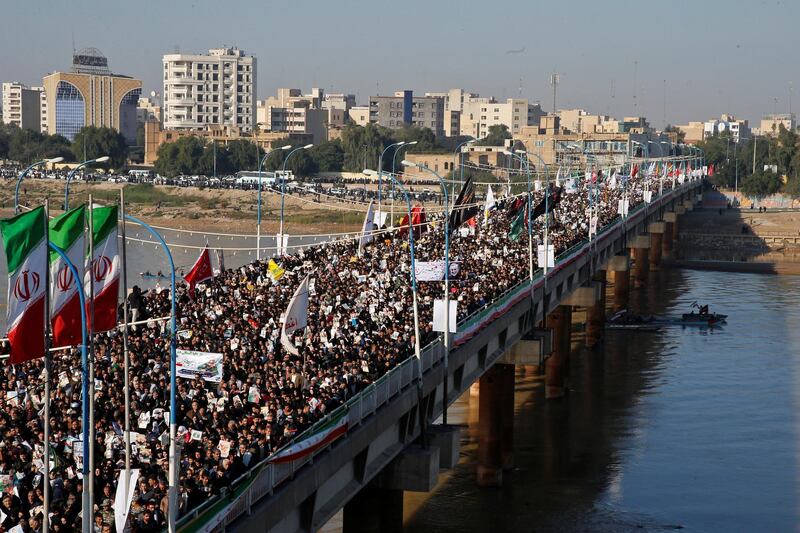Oil surged beyond $70 per barrel during early trading on Monday as the US and Iran threatened military escalation following the assassination of Tehran's top military commander in Baghdad on Friday.
Brent surged 2.3 per cent to reach $70.19 per barrel at 10.49am UAE time, while West Texas Intermediate was up 1.3 per cent at $64.35 per barrel.
Brent, the benchmark for more than half of the world's oil, climbed to an eight-month high, surpassing levels seen after the September 14 attack on Saudi Aramco's oil facilities, which temporarily took out 5 per cent of global oil supply.
The rally in prices came following US President Donald Trump's threat to target 52 sites, including those of cultural importance within Iran, should the Islamic republic initiate retaliation for the assassination of General Qassem Suleimani, the head of the elite Quds Force within the Islamic Revolutionary Guard Corps.
The military adviser to Iran's Supreme Leader, Hossein Dehghan, told CNN on Sunday that Tehran would retaliate in kind and would target US military sites.
"If he says 52 we say 300 – and they are accessible to us," he said.
President Trump said his earlier pronouncement on Twitter would serve as a notification to Congress and that the US would strike "in a disproportionate manner" if Iran attacked an American citizen or a target.
Tehran said it was scaling back on all its commitments to the Joint Comprehensive Plan of Action, known as the Iran nuclear deal, but would remain open to monitoring by the International Atomic Energy Agency.
"As 5th & final REMEDIAL step under paragraph 36 of JCPOA, there will no longer be any restriction on number of centrifuges," Iranian Foreign Minister Javad Zarif said on Twitter.
As 5th & final REMEDIAL step under paragraph 36 of JCPOA, there will no longer be any restriction on number of centrifuges
— Javad Zarif (@JZarif) January 5, 2020
This step is within JCPOA & all 5 steps are reversible upon EFFECTIVE implementation of reciprocal obligations
Iran's full cooperation w/IAEA will continue
The US, under President Trump, walked away from the nuclear deal in 2018. The agreement, signed by the world powers and Iran in 2015, constrained Tehran's ability to enrich uranium to weapons-grade capability in return for lifting nuclear-related sanctions and allowing the country's return to global financial markets.
Iraq's parliament also voted on Sunday to end the presence of foreign troops, including thousands from the US and planned to lodge a complaint with the UN over the killing of Suleimani.
Mr Trump said Washington would impose sanctions against Baghdad in retaliation for the parliamentary move.
"We've spent a lot of money in Iraq," he said on board the presidential plane, Air Force One.
"We have a very extraordinarily expensive airbase that’s there. It cost billions of dollars to build … we’re not leaving unless they pay us back for it," he added.
The geopolitical price support to oil comes at a time when fundamentals are beginning to increasingly point in the same direction, JBC Energy wrote in a note.
"For example, our global inventory indicator showed a build of some 50 million barrels for Q4 2018, while the last quarter came in at only 9 million barrels, indicating that the market is any way in an already tighter situation," the consultancy said.
With dimmer prospects for continued supply growth in the US as well as an expected revival on the demand side, the market is expected to remain tight.
"At least we would certainly not be surprised if prices were to go higher still," the report added .








